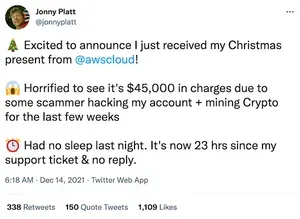$330 million in Bitcoin apparently stolen; laundering spikes Monero price by over 40%
Incognito Market drug marketplace pulls multi-million dollar double scam
Making matters worse, on March 10 the website posted a message reading, "Yes, this is an extortion !!" They wrote that, although the platform promised to "auto-encrypt" messages between buyers and sellers, and auto-delete after an expiry date, messages were not encrypted or deleted. They demanded that users pay an additional $100 to $20,000 to have their information removed from the dataset, which they promised to release at the end of May. "Whether or not you and your customers' info is on that list is totally up to you."
The tactic is reminiscent of that of ransomware groups, which often demand double fees: one from victims of hacks first to regain access to their systems, and another in exchange for a promise to destroy stolen data.
- Incognito Darknet Market Mass-Extorts Buyers, Sellers, Krebs on Security [archive]
Monero discloses that its community crowdfunding wallet was drained
The other person with access to the wallet is a former Monero developer named "fluffypony", or Ricardo Spagni. He surrendered to US authorities in July 2023 for extradition to South Africa, where he has been charged with invoice fraud against a cookie company (think chocolate chip, not software). However, he was released in late September, and has been working to "address this matter" while free but under court supervision.
Monero holders plan a bank run
To try to test this theory, Monero users have scheduled what is basically a bank run: they are encouraging all users to try to move their Monero out of exchanges on April 18. Some have claimed that exchanges including Binance and Huobi have frozen withdrawals of Monero in anticipation of the mass-withdrawal, in an effort to prevent their lack of reserves from being discovered. Indeed, Huobi suspended XMR deposits and withdrawals 10 days ago and has yet to restore the functionality, which they say is due to a wallet upgrade. Binance also shows "withdrawal suspended" on its status page as of April 14.
- " 'The Monerun' scheduled for April 18th, Monero's 8th birthday", Monero Observer
- "The Monerun", on r/CryptoCurrency



